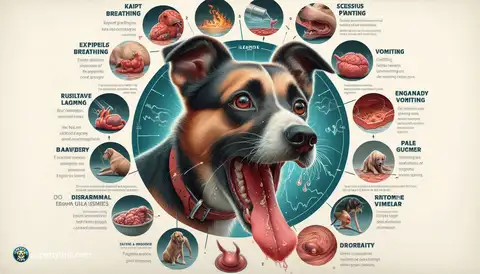
Recognizing Signs of Emergency in Dogs
Jeffrey Oxendine - Aug 25, 2024 - 7 min read


Puppies, much like human babies, require a well-balanced diet to support their growth and development. A balanced diet should consist of the right combination of protein, carbohydrates, fats, vitamins, and minerals. Protein is particularly important for building strong muscles, while carbohydrates provide the energy they need to stay active and playful. Fats are essential for healthy skin and coat, as well as for the absorption of certain vitamins. Vitamins and minerals play a crucial role in various bodily functions, from maintaining a strong immune system to supporting bone health.
When it comes to choosing the right food for your puppy, quality matters. Look for a reputable brand that offers specially formulated puppy food. These foods are specifically designed to meet the nutritional needs of growing puppies and often contain higher levels of protein and essential nutrients. Avoid generic or low-quality brands, as they may not provide the necessary nutrients your puppy needs for optimal health. Additionally, consider factors such as your puppy's breed, size, and age when selecting the right food.
Every puppy is unique, and their dietary requirements may vary based on factors such as breed, size, age, and activity level. Larger breeds, for example, may have different nutritional needs than smaller breeds. Similarly, puppies who are more active may require more calories to fuel their energy levels. It's essential to consult with your veterinarian to determine the best diet plan for your puppy based on their individual needs. Your vet can provide personalized recommendations and guidance to ensure your puppy receives the nutrients they need to thrive.
Consistency is key when it comes to feeding your puppy. Establishing a regular feeding schedule can help regulate their digestion and prevent overeating. Most puppies do well with three meals a day, spaced out evenly throughout the day. However, younger puppies may require more frequent feedings, while older puppies may transition to two meals a day. Be sure to feed your puppy at the same times each day and avoid free-feeding, where food is left out for them to eat at their leisure. This can lead to overeating and weight gain.
While it may be tempting to shower your puppy with treats and extra food, overfeeding can have negative consequences on their health. Obesity is a common issue among dogs, and it can lead to a variety of health problems, including joint issues, heart disease, and diabetes. Be mindful of portion sizes and avoid feeding your puppy table scraps or excessive treats. Stick to the recommended feeding guidelines provided by your veterinarian or the food manufacturer, and monitor your puppy's weight regularly to ensure they are maintaining a healthy body condition.
As your puppy grows, their nutritional needs will change. It's essential to monitor their growth and development closely and adjust their diet accordingly. Your veterinarian can help you determine the appropriate amount of food to feed your puppy based on their age, weight, and activity level. Additionally, keep an eye out for any signs of nutritional deficiencies or excesses, such as poor coat quality, lethargy, or digestive issues. By staying vigilant and proactive, you can ensure that your puppy receives the proper nutrition they need to thrive.
Mealtime should be a positive and enjoyable experience for your puppy. Create a designated feeding area free from distractions, such as loud noises or other pets. Use a clean and sturdy food bowl that is appropriate for your puppy's size and breed. Avoid plastic bowls, as they can harbor bacteria and cause skin irritation. Instead, opt for stainless steel or ceramic bowls that are easy to clean and disinfect. Additionally, make sure your puppy has access to fresh water at all times to stay hydrated.
Mealtime can also be an excellent opportunity to reinforce good behavior and obedience training with your puppy. Use their food as a reward for following commands such as sit, stay, or come. This not only helps strengthen your bond with your puppy but also encourages them to obey commands and learn new skills. Be patient and consistent with your training efforts, and always use positive reinforcement techniques rather than punishment. With time and practice, your puppy will learn to associate mealtime with positive experiences and good behavior.
To keep mealtime interesting and engaging for your puppy, consider incorporating food enrichment activities into their routine. This can include puzzle toys, treat-dispensing balls, or frozen stuffed Kongs. These toys not only provide mental stimulation but also encourage your puppy to work for their food, which can help prevent boredom and reduce the risk of behavioral issues such as chewing or excessive barking. Rotate different toys and activities regularly to keep your puppy stimulated and entertained.
Feeding your puppy a nutritious diet and establishing a healthy mealtime routine are essential aspects of responsible pet ownership. By understanding your puppy's nutritional needs, establishing a regular feeding schedule, and creating a positive feeding environment, you can help set them up for a lifetime of good health and well-being. Remember to consult with your veterinarian for personalized recommendations and guidance tailored to your puppy's individual needs. With proper care and attention, you can ensure that your puppy grows up strong, healthy, and happy.